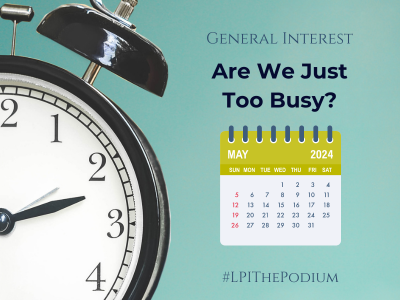
As I was getting off BART on a recent commute home, I thanked a woman who held the elevator for me as I hustled off the train. She was traveling on a bike after getting off the BART train. I commented that it was a nice evening to be commuting home on a bike. She pointed to her phone, which was mounted on the handlebars, and told me she was in a meeting. I couldn’t help but wonder why she was going to try to ride a bike while she was on a Zoom meeting. How could she concentrate on the meeting while worrying about the traffic she was going to encounter on the streets? Have you ever stopped and wondered if maybe you’re just too busy? I think this woman should consider just that.
The fact is, most people are too busy. According to surveys conducted in recent years by the Pew Research Center, 52 percent of Americans are usually trying to do more than one task at a time. And 60 percent sometimes feel too busy to enjoy life. Among parents with children under age 18, 74 percent said they feel too busy to enjoy life.
It might seem easy to just do less. Unfortunately, it’s not that simple. Understanding why you have so much to do and too little time to do it can help you tackle the problem, thereby lowering stress and allowing for more enjoyment of life. Having too little discretionary time does lower the level of happiness. But having too much free time reduces one’s satisfaction with life due to idleness. Did you ever have a class that was too easy, or a job with too little to do? That might have been fun for a while until boredom set in.
Researchers at the University of Pennsylvania found that 9.5 hours of free time daily was the optimal amount. The average number of discretionary hours enjoyed by people is 1.8. Long work days and life’s responsibilities are having long-term health consequences. So even if 9.5 hours a day is unrealistic, increasing the amount of discretionary time is the right strategy for most people.
So why aren’t we insisting on more balance in our lives? For many people, too much discretionary time is scarier than having too little. If we don’t know what to do with that time, it can lead to idleness, which leads to boredom. Scrolling through social media or staying busy with goal-oriented tasks are examples of how you might avoid boredom.
There are two other factors that come into play when we make ourselves overly busy. Busyness tends to confer social status in American culture. Also, work performance and busyness can be related. Most people do not allow for enough discretionary time in their workday, which could be driven by a fear of idleness and boredom.
The first step in confronting this aversion to idleness is to monitor your work patterns and commitments for a week or so. Note how you spend any free time that does occur in your workday. Making a list of discretionary tasks that are creative can be helpful in allowing for more discretionary time. For example, a friend of mine recently told me that she decided to learn a new crochet technique and has been spending time regularly crocheting. Try getting your work done within regular work hours; i.e., set boundaries for overtime work or keep your lunch hour for leisure activity which will give you time for activities you enjoy. For example, I never work through lunch, or even do personal errands on my lunch hour. That is a time for me to socialize, read, or work on a craft project. Carving out time for hobbies, music, and visiting family and friends can be an incentive to continue to make time for these activities.
Next month, we’ll take a look at some good uses for this additional discretionary time and how you might benefit from it.
Categorized in: General
| << previous | next >> |








